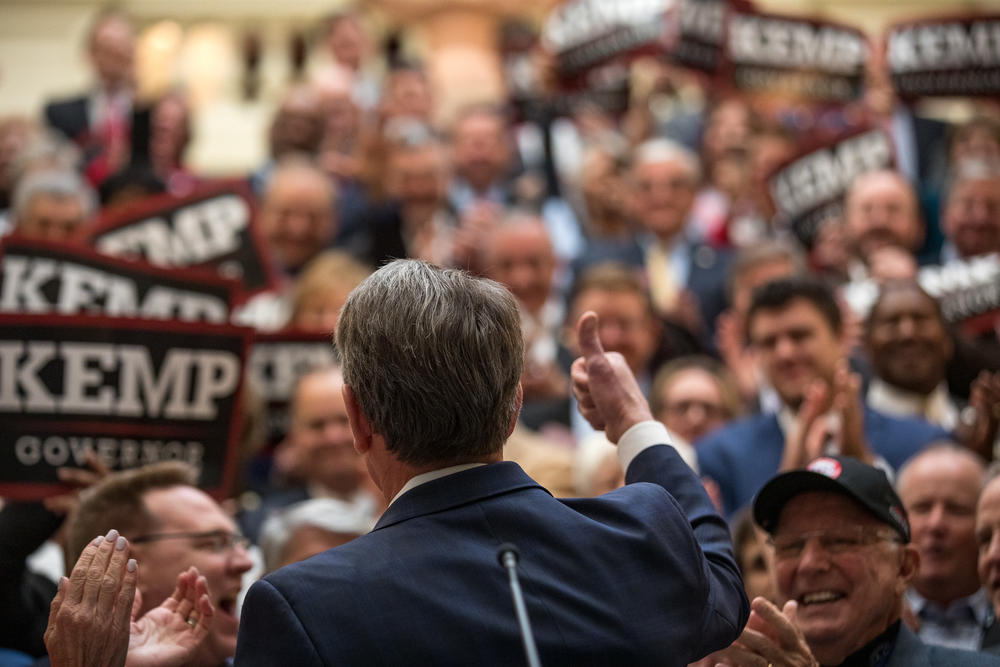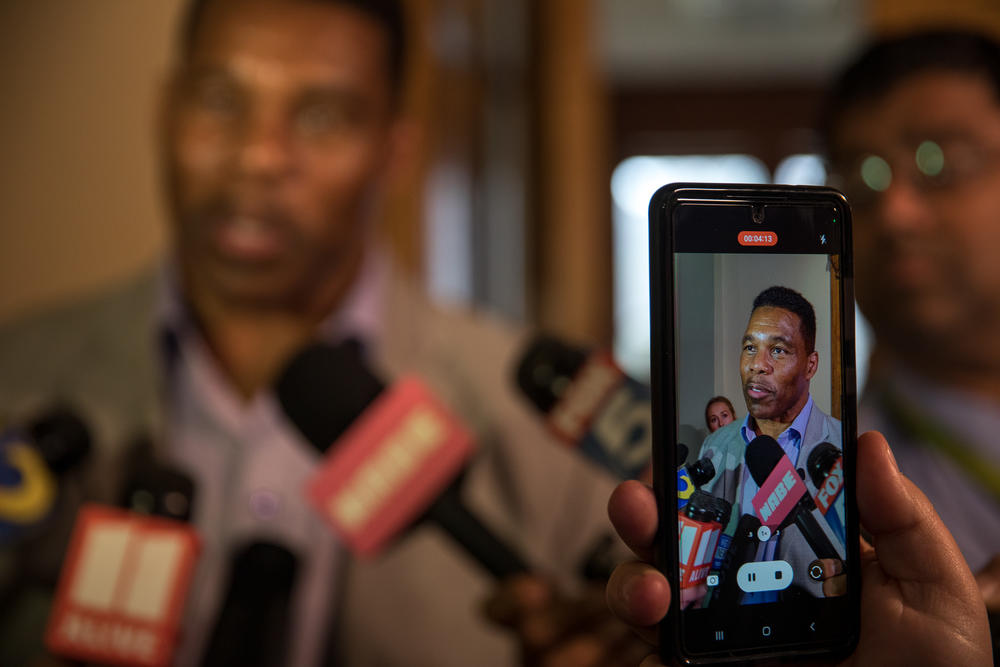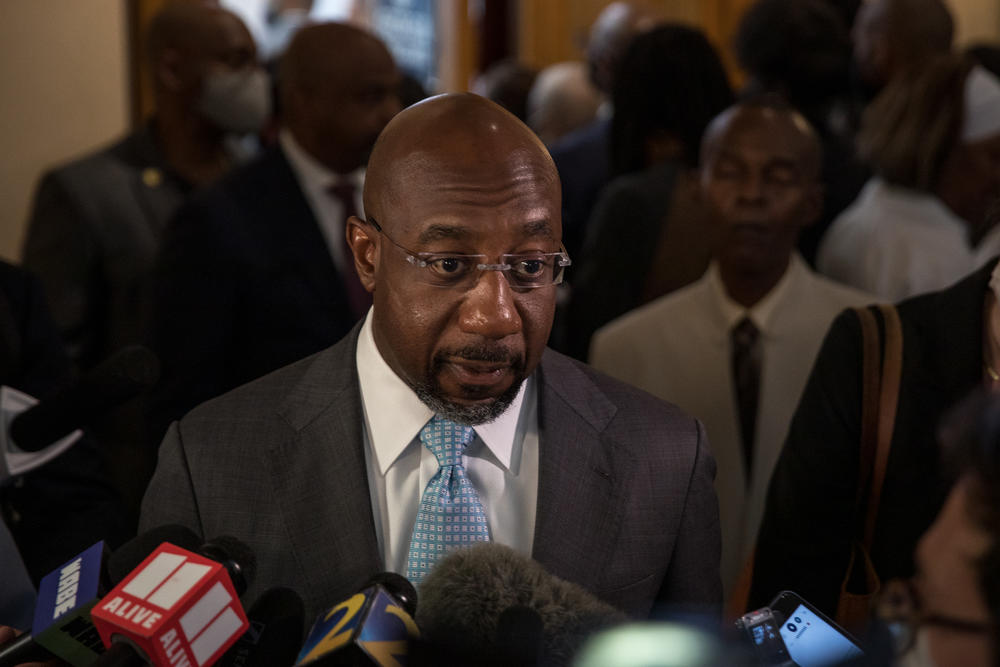
Caption
Gov. Brian Kemp faces a stiff primary challenge from former Sen. David Perdue. If he succeeds, the contest against Democrat Stacey Abrams won't be much easier.
Credit: Riley Bunch | GPB News
From U.S. Senate to state legislator, hundreds of political hopefuls have trekked to the Capitol to put their name on the ballot during qualifying week, setting the stage for messy intraparty battles in May before an equally contentious November election.
As the slate of candidates takes shape for Republican and Democratic primaries, the national attention on Georgia's political landscape continues to shine bright.
MORE: See the list of qualified candidates for each race
On Thursday, Gov. Brian Kemp was greeted by chants of "Four more years!" by a large crowd of supporters inside the Capitol after submitting his paperwork to run for reelection.
"We promised that we would raise teacher pay, invest in our schools, crack down on gangs, keep our state No. 1 for business and prioritize economic development in rural parts of our state, that we would fight for our values and ignore those who wanted to play politics," Kemp said about his 2018 campaign. "I'm proud to say that by working together, we have done that."

Gov. Brian Kemp faces a stiff primary challenge from former Sen. David Perdue. If he succeeds, the contest against Democrat Stacey Abrams won't be much easier.
Kemp's speech was heavy on his accomplishments in office and attacks on Democrat Stacey Abrams, whom he narrowly defeated in 2018 and could likely face again in November.
"I've been focused on Stacey Abrams — we've been waiting for this day for three years," Kemp told reporters. "You know, what we're going to have to overcome to win the nomination, we're not taking for granted, but our sights are focused on who the real opponent is going to be."
Abrams' qualifying remarks focused on calling for full Medicaid expansion in Georgia and slammed the "inaction and ineptitude by the current governor."
But Kemp will have to face former ally and former U.S. Sen. David Perdue in a primary, after former President Donald Trump recruited him to challenge the governor after Kemp certified Trump's 2020 election defeat.
RELATED: Can Gov. Brian Kemp convince conservatives Trump is wrong?
Perdue told reporters after qualifying that his run, which has further divided the GOP, could ultimately unite it if he is victorious.
“I just don’t see how Brian is going to pull together all the Republican Party to stand up against Stacey," he said. "They’re too upset about too many things right now.”
MORE: The primary paradox of David Perdue's run for governor
Trump's 2020 loss has boosted a slate of Republican primary challengers seeking to ride a wave of anti-incumbent sentiment that will test the strength of the former president's power in the party. He has endorsed State Sen. Burt Jones for lieutenant governor, U.S. Rep. Jody Hice for Secretary of State, former lawmaker Vernon Jones in the 10th Congressional District and football star Herschel Walker for U.S. Senate.

Republican U.S. Senate candidate Herschel Walker takes questions at a rare appearance in front of reporters during qualifying for the 2022 election in Atlanta early March 2022.
Walker, who has largely avoided public events, interviews and media availabilities, said he would not debate his primary opponents, confident in polling numbers that show him winning and comparing debates to playing "games."
Agriculture Commissioner Gary Black and other opponents decried Walker's refusal, arguing he would lose to Democratic Sen. Raphael Warnock because he was not equipped to handle the type of campaign needed to defeat him.
Meanwhile, Georgia Democrats, fresh off of victories in dual U.S. Senate runoffs and electing Joe Biden into the White House, have their own high-profile primary battles before November.

Democratic Sen. Raphael Warnock is one of the most vulnerable U.S. senators up for reelection in 2022.
After Republican lawmakers redrew the 6th Congressional District to favor Republicans, incumbent U.S. Rep. Lucy McBath switched into the now-Democratic 7th District against fellow Rep. Carolyn Bourdeaux.
But while Georgia is a competitive battleground for statewide races, many legislative districts are not. Dozens of seats in the state legislature, and all but one of the state's 14 U.S. House seats, will likely be decided in the partisan primaries.
Under the Gold Dome, several retirements will alter the leadership landscape beyond electing a new lieutenant governor. Powerful Senate Rules committee chairman Jeff Mullis announced he would not run for reelection, joining House budget chairman Terry England and dean of the House, Democrat Calvin Smyre, as several long-serving officials who will not return.